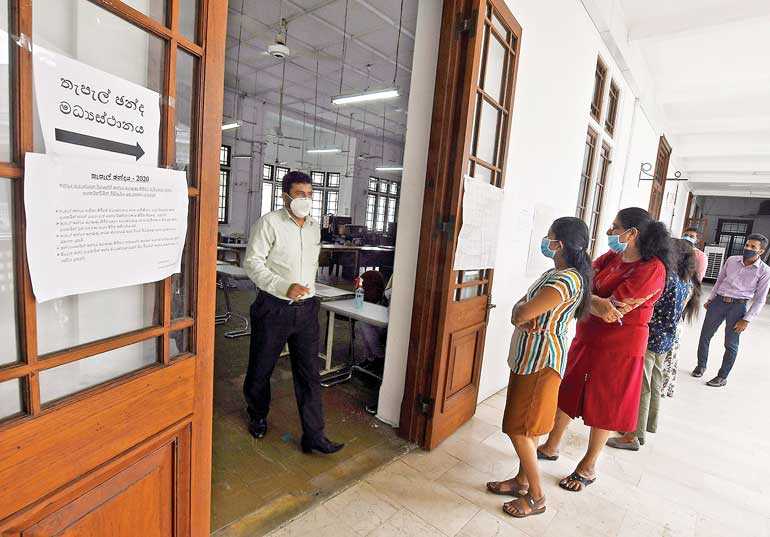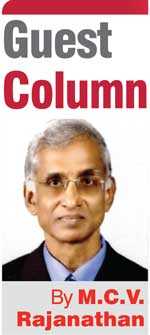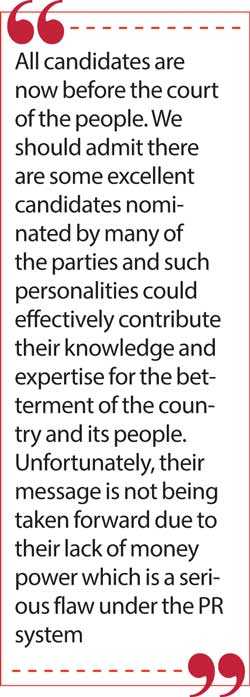Saturday Feb 21, 2026
Saturday Feb 21, 2026
Tuesday, 21 July 2020 00:00 - - {{hitsCtrl.values.hits}}

The candidates, past members of Parliament, ministers and State ministers are all now before the court of the people, who will ultimately judge their past performance, suitability, delivery of promises, etc. The voters of the country are now in possession of the strongest power and all candidates are now at their mercy. They possess the power to decide our representation for the next five years – Pic by Shehan Gunasekara
The countdown has begun. After facing many obstacles and uncertainty due to COVID-19, the Election Commission is now scheduled to hold the Parliamentary Elections on 5 August. This is one of the biggest challenges faced by the Election Commission, which no other previous commissions have ever faced, due to the pandemic.
The candidates, past members of Parliament, ministers and State ministers are all now before the court of the people, who will ultimately judge their past performance, suitability, delivery of promises, etc. The voters of the country are now in possession of the strongest power and all candidates are now at their mercy. They possess the power to decide our representation for the next five years.
COVID-19, which no one expected, has changed the electoral calendar and the expectation of all parties to their complete surprise. Whatever said and done a country cannot and should not be allowed to govern without parliamentary power, which is the supremacy of the people. The Election Commission needs to be commended for their boldness in taking appropriate steps in ensuring the people’s franchise is safeguarded by rescheduling the dates and adhering to the health guidelines stipulated by the health authorities. Getting the voters to the polling booths will be the major challenge at this election.
By all accounts and from the murmurs we hear from the people at various fora and social gatherings, this election may record the lowest turnout since independence. People appear to be really frustrated and disappointed of the performance of the politicians and notably some of the past members of Parliament irrespective of the parties.
Voters unaware of candidates
Under the present PR system, many of the voters do not even know nor are aware of their candidates. This is the stark reality. We could see the constant publicity being given by some of the leading candidates both in the print and electronic media which is very costly. This bears testimony to the money power they possess. This has deprived many intellectuals and candidates of integrity in taking their message across to the people. It is noted most of the parties have re-nominated many of their past members of Parliament. My guess is many of them may get re-elected mainly due to the existing PR system and their ability to have an effective marketing campaign.
All major parties have also nominated some excellent candidates with good track records apart from their intellectual acumen. Unfortunately, due to their lack of money power to match the other well-known competitors, they are unable to take their message forward. In many districts the voters appear to know the names of only a handful of candidates. They have no idea nor clue of many of the competing candidates. This I say as I have consistently advocated in my previous articles the PR system (Proportional Representation system) which is the root cause.
People with money power, whatever their past records, may ultimately gain entry to Parliament and some may, even if they fail, still attempt to enter through the National List. In the previous Parliament we had many such defeated candidates accommodated by all parties; some of them were even rewarded with ministerial posts. They changed their allegiance when they realised the wind was changing and are now seeking re-election.
After the conclusion of the Parliamentary Elections, we will have another election, the Provincial Council Elections, which may take place before the end of the year. After this we could expect the Local Government Elections. Elections after elections. Even if a party is unable to obtain a two-third majority at this election, this will not be an issue as many may crossover for perks and privileges in the absence of the ‘Anti Defection Law,’ which effectively shuts the door for such crossovers. Many have formed alliances with friends and foes alike with the sole intention of obtaining electoral benefits. In politics they say “there are no permanent friends or enemies only permanent interests”. These are interesting and difficult times for the voters to select their candidates.
There is a clamour by some, especially the Interim Government, to amend the 19th Amendment, which has some positive as well as certain negative aspects. They are on a campaign for a two-third majority to achieve their objective which appears to be difficult under the PR system. However, whichever party wins, if they are unable to obtain a two-third majority, if positive steps are taken they could expect the support of all parties who will be obliged to extend their support.
19th Amendment
When the 19th Amendment was introduced, I was alarmed to note the Constitutional provision which deprived the President of the power to dissolve Parliament unless it is voted by two-third of the members of Parliament. Such an exercise is unthinkable as no member of Parliament will give their consent in signing their own death warrant, as such an exercise will deprive them of their perks and privileges. The framers of this stipulation failed to realise this aspect and its reality.
This resulted in the major constitutional crisis in October, 2018 which was ultimately resolved by the Supreme Court by its unanimous decision in ruling the President has no power to dissolve the Parliament before the expiry of the stipulated period of four-and-a-half years. This provision even deprived the new President in dissolving Parliament immediately after his victory in November, 2019, which would have saved the calamity of having the elections under the present health crisis.
I very well remember, during the Presidential Election of December 1988, immediately after the results were officially announced the then President J.R. Jayawardene, signed the proclamation dissolving the Parliament even before the new President could take his Oath of Office.
There are several issues which are being put forward by the parties and the major one appears to be the amendment of the 19th Amendment which has clipped some of the powers of the President.
I should confess I am not a constitutional expert. However, being a keen follower of the political developments in the country as a student of politics and one who is very much interested in the political developments, I wish to take this opportunity in expressing some of my thoughts, with the readers and for the benefit and consideration of those who will be entrusted with the responsibility of drafting and amending the Constitution which I am sure will take centre r stage immediately after the formation of the new government. I will however, restrict my opinion only to the electoral reforms.
Proposed amendments: It is no exaggeration to state a vast majority of the people are of the opinion that the existing electoral system is not suited for the democratic form of governance, hence it needs a change. Even some of the leading candidates, have stressed the necessity of amending this in view of the current interparty clashes for preferential votes. It is vital and interesting to examine some of the flaws at this crucial time.
In the past prior to the introduction of the PR system, whenever a vacancy occurred in Parliament, the people had the opportunity of electing a new member of their choice at a by election. In many countries such vacancies are filled by having by elections for a vacant seat. The PR system, deprived this opportunity to the people in electing the representatives of their choice.
This prevents the incumbent government from testing the public opinion at regular intervals whenever an opportunity arises due to the death or resignation of a member. Prior to 1978, whenever a vacancy occurred all such vacancies were filled after a by-election in which the governing party and the opposition parties vigorously campaigned. This gave an opportunity to the people to give a message to the government and the opposition on several vital issues affecting not only the particular electorate but also the entire country. There were instances of leaders of political parties resigning their seats on policy issues and going before the people for a fresh mandate.
I remember two such major resignations; J.R. Jayewardene, the then Leader of the Opposition and first MP for Colombo South, resigned his seat in protest against the extension of the life of the Parliament by the then Government of Sirimavo Bandaranayke. The other was the resignation of S.J.V. Chelvanayakam, the then Leader of the Federal Party who resigned his Kankesanthurai seat in protest against the introduction of the 1972 Constitution. Both the aforesaid personalities were re-elected with wider margins in spite of the massive Propaganda of the then Government.
The replacement of this system by PR resulted in a situation where such vacancies are now filled by the defeated candidates according to the order of preference of the votes gained at the previous election. Individuals defeated at the previous elections become members of Parliament overnight and the voters are deprived of an opportunity to elect a new representative of their choice. The proposed constitutional reforms should bring back the system of holding “by-elections” whenever a vacancy occurs in Parliament.
PR system
Our existing preferential system leads to candidates from the same party attacking and competing against each other as we have seen in the media which is enjoyment for the people. The party leaders appear to have no control. The existing system of proportional representation or “manape” as commonly known, in my view, is a completely outdated system of electing members to Parliament.
If a person is interested to serve the people and enter Parliament, such a personality is compelled to campaign not only in their chosen electorate as the organiser, but in the entire district. We have seen several instances in the past elections where such organisers even though they failed to win their designated electorate they gained entry to Parliament due to their power to win their district.
During my school days I have vivid memories of many leading and well known personalities of yesteryears who have immensely contributed to the Parliamentary debates and also to the country, visiting our residence and interacting with our parents and also with us even though we were not eligible to vote. Such an environment does not prevail now.
I cherish the opportunity I had in visiting the old Parliament many years ago several times and listening and enjoying such debates of great personalities of yesteryears, as a student of politics which still lingers in my mind. It was a great pleasure to listen to such debates of eminent personalities.
Under the present PR system in certain cases, some electorates were fortunate to have more than one member to represent them while a few others have none to represent their interests in Parliament.
Candidates well accepted and respected in their chosen electorates fail to enter Parliament even though a majority of their electorates vote for them. This is due to their failure to match the resources of other wealthy and powerful candidates within their own party who are ultimately in a position to win the entire district even though they may not be the popular choice of their designated electorate. This has happened in the past and is bound to happen at the impending elections. We could see the images of some of the candidates who repeatedly market their preferential number with attractive and colourful slogans with their smiling faces. Many respected candidates are unable to market their candidacy due to limited resources.
Our existing electoral system and the procedure being adopted in electing a representative lead to candidates from the same party firing shots at each other to obtain preferential votes. Candidates have to compete not only with their rivals in the opposing parties but their rivals in their own party as well.
The re-introduction of the ‘First Past Post System’ in which people elect their representatives’ electorate wise is the need of the hour as this will ensure not only the entry of decent and people of high integrity; it will also provide people with the representatives they deserve.
National List
It is not an exaggeration to state this has created lot of controversy. The existing National List provides for the appointment of a total of 29 members to Parliament based on the percentage of votes polled by each registered party. The framers of the Constitution envisaged the introduction of the National List mainly to accommodate intellectuals and technocrats, not in a position to contest and win at an election as the country could immensely benefit from their expertise.
The original purpose for which this was introduced does not appear to have been achieved. This has become a ‘back door’ entry for defeated candidates. Many defeated candidates will clamour and attempt to enter through the National List after the elections.
Parliament is the temple of democracy. Sri Lanka may be the only country where defeated candidates could still enter Parliament through the back door thanks to the National List. Several members of the civil organisations and intellectuals and even some of the leading party stalwarts’ have been consistently expressing their disapproval of accommodating defeated candidates through the National List. Some of the parties have pledged to refrain from accommodating defeated candidates after this election.
Anti-Defection Law
Serious consideration should be given to introduce the ‘Anti-Defection Law,’ which will effectively prevent the members from crossing over to other parties. If they cross over they should automatically forfeit their seat and seek re-election. This provision is available in the Indian constitution. However, I understand although this was included in the 19th Amendment due to the objections of some members this was withdrawn.
Expenditure on elections
Massive amounts are being spent on the elections and according to media reports a sum of Rs. 10 billion is estimated to be expended at the upcoming General Elections. The expected expenditure has gone up due to the introduction and implementation of health measures stipulated by the Health Authorities, adherence of which is an absolute necessity. This will be followed by the Provincial Council Election, Local Government Election all of which are estimated to cost a sum of well over Rs. 25 billion in total.
The proposed amendment should seriously consider a mechanism to have at least all three major elections on the same day (i.e., the Presidential, Parliamentary and Provincial Councils). The voters could be given three ballot papers to elect their president, member of Parliament and the provincial councillor on one and the same day. Not only billions of rupees could be saved, it will ensure political stability in the country and the policy makers could concentrate on their mandate and responsibilities entrusted to them by the people.
In the United States the people elect their president, members of congress and the senators on one and the same day in addition to other state elections. However, the senators and members of congress are elected at regular intervals for a term of six years and two years respectively. The Presidential Election is held every four years on the first Tuesday of November of the stipulated year.
The Election Commission, I am confident will be in a position to effect suitable mechanism to meet such an eventuality, which in my opinion is not difficult as they have faced bigger challenges.
Presidential Election
The last Presidential Election, resulted in the candidacy of 34 candidates contesting, knowing very well their prospects of victory was remote. Some filed in their nominations as proxies for the major candidates while some others filed in their nominations with the aim of gaining cheap publicity. I remember one such candidate in one of the previous Presidential Elections, in his letter head was boasting of being a presidential candidate even though he lost his deposit. This cost the country and the Election Commission an additional Rs. 2 billion. In addition, it confused the voters in appropriately identifying their preference from the long ballot paper which had to accommodate all 34 candidates.
The eligibility criteria should be amended to make it mandatory for a candidate to at least obtain a stipulated minimum number of votes from the total votes polled. The deposit too should be increased substantially.
The choice before the people
All candidates are now before the court of the people. We should admit there are some excellent candidates nominated by many of the parties and such personalities could effectively contribute their knowledge and expertise for the betterment of the country and its people. Unfortunately, their message is not being taken forward due to their lack of money power which is a serious flaw under the PR system.
Many years ago in the absence of advanced technology, the print media used to carry supplements under ‘Know Your Candidates’ similar to the present KYC (Know Your Customer) adopted by banks prior to the opening of an account. This gave an insight to the voters of the candidates’ suitability, their profession, experience contribution, etc. Such an exercise appears to be difficult under the present system as more than 7,000 candidates are competing for 225 seats in Parliament.
The countdown has begun. Let the people elect suitable representatives, irrespective of the parties to serve them for the next five years. This is the hope and aspiration of all.